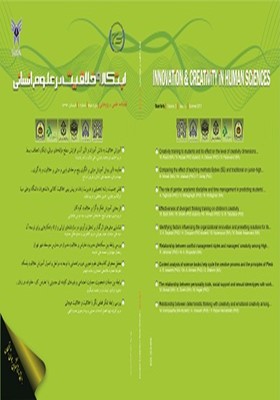Relationship between deterministic thinking with creativity and emotional creativity among students of public universities in Tehran city
Subject Areas : Creativity and innovation from psychological, epistemological, educational and pedagogicalMaryam Koohpayeiha 1 * , Afzallsadat Hosseini 2 , Vida Razavi Nematollahi 3
1 - نویسنده اصلی
2 - نویسنده
3 - نویسنده
Keywords: Creativity, deterministic thinking, Emotional Creativity, cognitive distortions,
Abstract :
Background: Barriers to creativity in general contains to four historic-cultural barriers, social-environmental barriers, organizational barriers and personal barriers. Cognitive barriers counted as important barriers of creativity. Meanwhile mental model consider as the main kind of cognitive barriers to creativity. Objective: This research has been designed for the purpose of studying relationship between deterministic thinking with creativity and emotional creativity among students of public universities in Tehran city in the academic year of 2011-2012. Method: 200 students were randomly selected as sample group using cluster sampling method. For studying deterministic thinking, Yunesi deterministic thinking questionnaire included 36 questions with 4 subscales has been used. For creativity, Abedi creativity questionnaire included 60 questions had been used. For studying emotional creativity, Emotional creativity scale included 120 questions had been used. For checking collected data descriptive statistical methods, Pearson correlation coefficient, and regression analysis has been used. Results: Results revealed that there was a meaningful relationship between deterministic thinking and creativity (r = -0/40). Also among the subscales of deterministic thinking the relationship between absolute orientation and deterministic thinking in negative events with creativity is meaningful. While the relationship between deterministic thinking in interaction with others and deterministic thinking in predicting future with creativity is not meaningful relationship. Moreover, the relationship between deterministic thinking and emotional creativity is a meaningful relation (r = -0/47). Also the relation between deterministic thinking in interaction with others and deterministic thinking in negative events and absolute orientation with emotional creativity is meaningful relation but the relation between deterministic thinking in predicting future with emotional creativity is not meaningful. Conclusion: Based on these findings, we need to eliminate cognition barriers of creativity such as deterministic thinking with teaching and giving advice.

